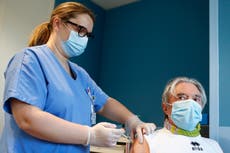Imperial College London halts testing of Covid-19 vaccine to focus on new variants
‘It is not the right time to start a new efficacy trial for a further vaccine in the UK, with the emphasis rightly placed on mass vaccination,’ says professor Robin Shattock
Scientists at Imperial College London have announced they will not be proceeding with large-scale testing of their Covid-19 vaccine because of the rapid approval of other jabs within the UK.
Professor Robin Shattock said his team would instead be using the RNA technology behind the vaccine to target new and emerging coronavirus variants that have been identified around the world.
“Although our first generation Covid-19 vaccine candidate is showing promise in early clinical development, the broader situation has changed with the rapid rollout of approved vaccines,” Prof Shattock said in a statement on Tuesday.
“It is not the right time to start a new efficacy trial for a further vaccine in the UK, with the emphasis rightly placed on mass vaccination in response to the rapid spread of the new variant.”
He said his team would begin working to develop the vaccine technology as “a safety net to catch escape mutations, reach variants that other vaccines may not, and meet potential needs for annual booster vaccinations”.
Similar in design to the Moderna and Pfizer/BioNTech vaccines, the Imperial College jab makes use of self-amplifying RNA to deliver genetic instructions to human muscle cells, which then go on to produce the spike protein found on the surface of Sars-CoV-2.
Spotting what appear to be foreign invaders within the body, the immune system springs into action to produce the necessary antibodies and T cells, inducing protection.
Phase one and phase two trials for the vaccine were launched last summer amid the global race to develop an effective Covid-19 jab.
Some 400 volunteers, aged between 18 and 75, were injected with two doses of the vaccine over a four-week period.
At the time, it was hoped that the vaccine would progress to its phase three trial at the beginning of 2021 before securing approval in the summer.
However, as the UK continues to push ahead in its rollout of the Oxford/AstraZeneca and Pfizer/BioNTech vaccines, with more than 6.5 million first doses administered to date, Imperial College London has decided to switch focus.
The results of the phase one and phase two studies are still pending, and will inform the next steps of development, the university said, adding that it has “yet to exclude the potential of [an] international trial of the vaccine”.
Imperial’s self-amplifying RNA technology can be adapted to target new variants and mutations of Sars-CoV-2. This capability could be central in developing second-generation vaccines against Covid-19 as the pandemic progresses.
Prof Shattock told The Independent that his work will “help improve our capacity to provide rapid updates” to the vaccines currently in use, adding that Imperial College could strike up partnerships with other teams, such as those at Pfizer and Moderna.
“RNA vaccines can be quickly tweaked – essentially, it requires changing the RNA code and making new vaccine batches,” he said. “The approval process has yet to be tested, but it is anticipated that a change to the sequence could be approved relatively quickly and would not require additional efficacy trials for vaccines that have already reached approval.”
The team at Imperial College has also developed approaches that could enable RNA vaccines to be stored in ordinary refrigerators for months, rather than the extremely low temperatures required by the current RNA vaccines.
Having already committed millions of pounds to the vaccine project, the government will continue to support the development of the university’s self-amplifying RNA technology in relation to Covid-19 and future infectious diseases.
Professor Alice Gast, president of Imperial College London, said: “Imperial’s self-amplifying RNA vaccine has much to offer in the fight against coronavirus and other diseases.
“This exciting technology will help accelerate future vaccine production, providing the agility to defend against viral mutations, and protect current and future generations from pandemics.”
To date, a total of 6,853,327 first vaccine doses have been administered in the UK, according to the latest government data, while 472,446 people have received two full doses.
Based on these figures, an average of 407,334 first doses of vaccine would be needed each day in order to meet Downing Street’s target of 15 million first doses by 15 February.
Meanwhile, the World Health Organisation (WHO) has said that Moderna’s vaccine can be given in two doses as much as six weeks apart.
The WHO's Strategic Advisory Group of Experts on Immunisation, known as Sage, recommended that the jab be given at an interval of 28 days but said that could be extended by a further two weeks under exceptional circumstances.
“The main recommendation for the use of this vaccine is that, based on the current elements, we recommend it should be given in doses of 100 micrograms or 0.5 ml with an interval of 28 days,” Alejandro Cravioto, Sage’s chair, told a virtual briefing.
“This interval might be moved to 42 days, but the evidence we have does not go beyond that time,” he said.



Join our commenting forum
Join thought-provoking conversations, follow other Independent readers and see their replies
Comments